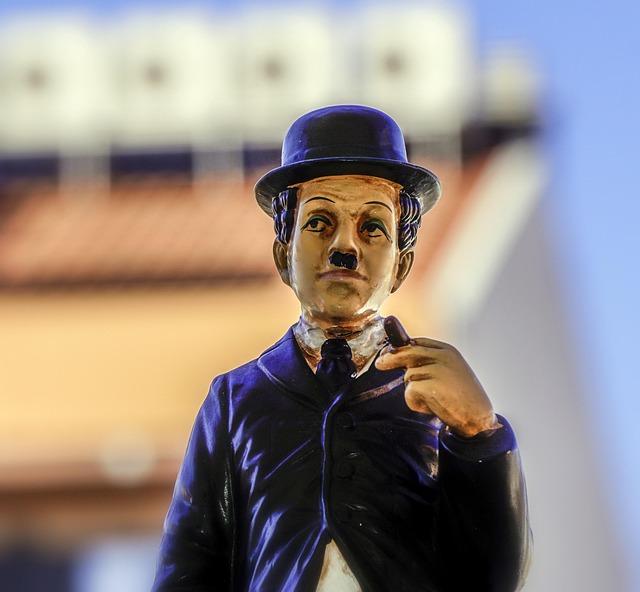Comedians and Sovereigns: Is Donald Trump Reviving the Ancient Offense of Lèse-Majesté?
In a world dominated by memes, viral content, and incessant social media discussions, few individuals have sparked as much humor—and debate—as Donald Trump. As the former president remains a fixture in news cycles and comedy sketches alike, an intriguing question emerges: is he breathing new life into the age-old concept of lèse-majesté? Traditionally, lèse-majesté denoted the crime of insulting or showing disrespect to a reigning monarch—a serious offense in various cultures that often led to harsh penalties. In today’s landscape, where comedians and satirists frequently lampoon Trump’s persona and policies, distinguishing between lighthearted critique and genuine offense becomes increasingly challenging. This article explores the ramifications of such humor within a political environment that scrutinizes authority like never before, examining whether Trump’s behavior and public reactions indicate a modern revival of this long-standing taboo.
Historical Significance of Lèse-Majesté and Its Modern-Day Implications
The notion of lèse-majesté has deep historical roots; it functioned as a tool for monarchies to uphold their power while stifling dissent. Initially aimed at punishing actions or remarks deemed disrespectful towards sovereigns, this ancient law can be traced back to Roman legal traditions before gaining traction in European monarchies where royal figures were considered sacred. The consequences were profound—curtailing freedoms related to speech and expression while positioning kings not merely as rulers but as divinely sanctioned entities deserving absolute reverence. Over time, societies have fluctuated between upholding these traditions or challenging them in favor of enhanced public discourse and accountability from those wielding power.
In today’s political climate—especially with figures like Donald Trump stirring passionate public debate—there’s growing concern that sentiments reminiscent of lèse-majesté may be resurfacing. Throughout his presidency, Trump often highlighted perceived slights against him as significant offenses akin to historical royal grievances. In this context, we can identify several key aspects regarding how this ancient crime resonates today:
- Accountability for Public Figures: The ongoing tension between freedom of expression versus protecting the reputations of those in power.
- The Role of Social Media: Platforms amplifying dissenting voices challenge traditional authority structures while complicating acceptable discourse.
- Cultural Shifts: A societal trend toward protective attitudes echoing monarchical norms may be emerging.
Acknowledging these dynamics is crucial for understanding how ancient concepts persist within contemporary governance structures while raising essential questions about our rights to criticize authority figures.
Humor in Political Discourse: Evolving Satirical Norms
In our current digital age, humor has become both an asset and liability within political discussions—especially concerning leaders like Donald Trump. Comedians now find themselves at the crossroads between entertainment value and political commentary; they wield satire both defensively against criticism yet also offensively against powerful figures. The resurgence of ideas akin to lèse-majesté—where disparaging remarks about royalty could lead to punishment—is reflected today through comedians facing backlash for their critiques on influential leaders’ actions or statements.
The rules governing comedic engagement have shifted dramatically with social media acting simultaneously as an amplifier for jokes yet also serving as judge over what constitutes acceptable humor:
- Broad Accessibility: Humor can reach vast audiences almost instantaneously making complex political issues more relatable.
- Immediate Feedback Loops: Jokes provoke swift reactions which can shape public opinion dynamically.
- Pervasive Polarization: As satire sharpens its focus on specific targets it risks deepening societal divides with each faction claiming ownership over comedic narratives relevant only to them.
Within this evolving landscape where comedy intersects activism,traditional notions surrounding respect towards authority are being challenged alongside redefined boundaries regarding acceptable criticism.
Free Speech Navigation: Guidance for Comedians Amidst Political Tensions
Navigating today’s politically charged atmosphere requires comedians tread carefully along tightropes balancing humor against potential backlash stemming from sensitive topics surrounding figures such as Donald Trump himself raises critical inquiries into satire’s limits.
To effectively address pressing issues without crossing lines deemed harmful or offensive requires nuanced approaches including but not limited too:
- Audience Awareness: Tailoring content according audience values ensures relatability without alienation.
- Keen Awareness Of Current Events : strong > Staying informed about ongoing developments allows relevant commentary avoiding outdated references likely causing offense.
li >- < strong >Self-Reflection : strong > Challenging personal perspectives encourages adaptability based upon feedback received from audiences & peers alike .< / li >
ul >Additionally , recognizing how modern interpretations reflect revived sentiments around concepts similar too lèse -majesté —an affront directed towards sovereign dignity —is vital . Comedians must navigate perceptions surrounding satire viewed directly opposing established authorities . Techniques employed might include :
Technique Description < strong >Irony : strong > td >< td >Utilizing irony juxtaposes expectations versus reality sidestepping direct confrontation .< / td > tr > < td >< strong >Hyperbole : strong > Exaggerating traits/actions highlights absurdities remaining within legal/ethical bounds .< /td > Final Thoughts
This ongoing dialogue surrounding Donald Trump’s presidency continues evolving alongside renewed awareness regarding concepts rooted deeply within history such as lése -majesté —an offense once holding individuals accountable insults directed toward thrones now finds expression through realms encompassing social media ,political satire ,and tumultuous relationships existing between leaders constituents alike .
By examining ways comedians &public personalities navigate This delicate balance reveals landscapes wherein humor intertwines criticism intersecting authority dignity leadership itself .
Whether resurgence witnessed reflects shifting societal norms indicative polarizing nature associated reign remains uncertain moving forward engaging critically necessary recognizing implications hold free speech ,political discourse fabric democracy itself .
The intersectionality present comedy governance prompts essential inquiries concerning boundaries expressions respect accorded those positions power during heightened scrutiny periods ahead laughter accompanying scrutiny will undoubtedly continue shaping narratives defining American politics overall .
- < strong >Self-Reflection : strong > Challenging personal perspectives encourages adaptability based upon feedback received from audiences & peers alike .< / li >









